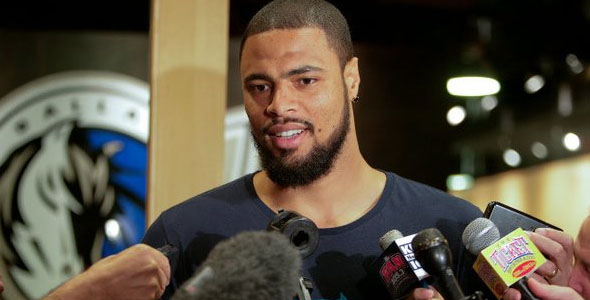 Darkness, in the form of immense idleness, has set in over the NBA and basketball community at large.
Darkness, in the form of immense idleness, has set in over the NBA and basketball community at large.
Any and all activity is basically suspended. For real. Summer league is long gone, training camps and preseason games remain a ways off and, now, following Team USA’s gold medal at the 2014 World Cup, there isn’t even the comfort of guaranteed exhibition victories to offer respite from the dull and drab offseason.
As with any end, though, there awaits a new beginning. And for Team USA, the life it knows, the structure fans—both casual and diehard—understand, may soon be over.
Paul George’s injury changed everything. When the he suffered a compound leg fracture during Team USA’s internal scrimmage, ending his 2014-15 season long before it began, outcries ensued. Ripple effects slowly, surely, cut their way through the basketball sphere, both subtly and obviously, some inflicting more hurt, disturbance and perspective than others.
Dallas Mavericks owner Mark Cuban let his thoughts be known. Calls for Derrick Rose to leave Team USA instead of risking further injury increased in volume by many, including from yours truly. Kevin Durant left for rest and relaxation. Or because of his shoe negotiations. Or perhaps because George’s injury scared him. Or perhaps because, well, he really wanted to rest.
Drastic change never once seemed imminent. Broken as the current model is, it’s the best out there. No use distorting and contorting it into something else, solving one problem while creating another.
Right?
According to Yahoo Sports’ Adrian Wojnarowski, change is, in fact, on the way for Team USA. Within an emotionally charged, extremely well-written diatribe during which he eviscerates Team USA’s current model along with the intentions of head coach Mike Krzyzewski, Woj offered the following tidbits of intel:
George will be the impetus to end the full participation of NBA stars, but far from the reason. After the 2016 Olympics in Rio, the World Cup of Basketball and Olympic Games are destined to become an under-22 developmental tournament.
“We need to get our vets out and move our younger players in,” one NBA general manager told Yahoo Sports. “The support’s there for the change, and it’s getting stronger.”
Forging an under-22 rule has been one of the more popular fixes. What does it fix exactly? Plenty.
None of the players—on Team USA or otherwise—will be playing on $90-plus million contracts. They’ll be on rookie deals, three years deep into their NBA tenure at most. If the NBA ever institutes some version of a two-and-done rule or 20-year-old age limit, the players will be even more green and, more importantly, further away from lucrative paydays that make owners and general managers sweat through tailored suits.
Only it does not come without risks. Instead of established players who have, for the most part, secured financial futures, there will be rookies and sophomores and third years still playing for that next contract. There will be college players who may not have even signed their first NBA pacts.
Futures could realistically go up in hellish flames before careers officially begin. Is that fair? Will we see more of those entering their fourth season elect to forego participation because they’re worried about damaging market value or losing leverage in extension talks?
Would this actually remedy anything, or just create different problems that are easier for NBA powers at be to stomach?
Owners and team employees are just in their outrage to a degree. Those—FIBA, namely—begging and pleading and demanding NBA veterans remain part of Team USA aren’t the ones assuming up to tens of millions of dollars in financial risk. Stringent age limits would also, in theory, increase international parity, going on the assumption inexperienced players are on equal or close to equal footing.
Yet who are we kidding? It doesn’t work like that. And the NBA would be supplanting one problem with another—a more convenient, Association-friendly conflict.
Therein exists the dilemma with any proposed panacea: it doesn’t exist.
Placing value on established and signed players makes sense for the NBA, but it’s a form of discrimination. Devaluing the worth of younger players is inherently wrong. Depriving veterans who actually want to represent their country is equally depraved.
The moral high ground is to maintain the status quo, regardless of how one believes Coach K and Team USA operate behind closed curtains. Let players have the final say, whomever they are. Implement contract clauses that give teams more power over players like Rose, who have spent the majority of the last season or two (or three) injured.
Just don’t protect the current brand at expense of the future one. Owners may sleep easier, and the outcome will remain the same in the end, but experimenting with upheaval simply to solve a problem that, when pitted against the odds of George being some injury-infested domino, doesn’t exist would be truly criminal.
More so than begrudgingly accepting the current model as the condition-crammed, tort-tamped, seldom-significant necessary evil it may or may not be.
Dan Favale is a firm believer in the three-pointer as well as the notion that defense doesn’t always win championships. His musings can be found at Bleacherreport.com in addition to TheHoopDoctors.com.




















